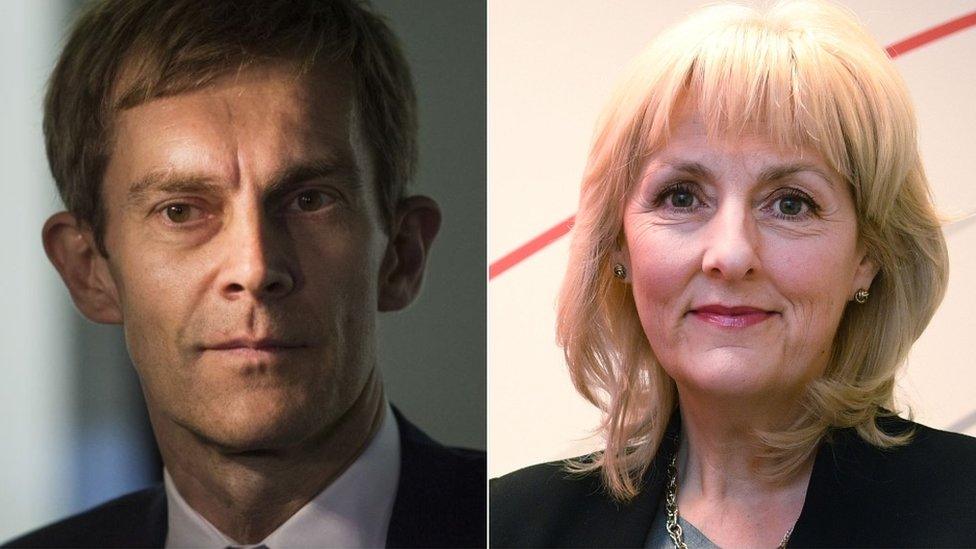Anti-Semitism: May and Corbyn clash over anti-racism records
- Published
May and Corbyn both went on the attack in relation to their anti-racism records
Theresa May and Jeremy Corbyn have clashed over their anti-racism records after the prime minister demanded an apology for anti-Semitism in Labour.
Mrs May said it was a "disgrace" Mr Corbyn had "dodged his responsibility" for tackling anti-Jewish prejudice.
The Labour leader insisted he was "dealing" with the issue.
And he said the PM should reflect on the impact of her own "hostile" immigration policies and her party's problems with Islamophobia.
Earlier on Wednesday, more than 60 Labour peers put their names to an advert in the Guardian accusing Jeremy Corbyn of failing to tackle anti-Semitism.
The signatories, who make up about a third of Labour members in the Lords, said the leader was presiding over a "toxic culture".
Brandishing a copy of the advert at Prime Minister's Questions, Mrs May said he could not "parade himself as the champion of the people and the defender of equality and fairness" until he apologised for his failure to get to grips with the problem of anti-Semitism.
"The person who has been dodging his responsibility is the right honourable gentleman," she said. "The real disgrace is his handling of anti-Semitism in the Labour Party."
In response, Mr Corbyn said he would "deal with any racism" in his party and "looked forward" to Mrs May doing the same with allegations of Islamophobia in the Tories.
"This party totally opposes racism in any form whatsoever. Anti-Semitism has no place in our society or any of our parties and no place in any of our dialogue," he said.

Crisis for Corbyn?
By BBC's assistant political editor Norman Smith
Although it was a bit of a cheek for Theresa May to lean over the despatch box and demand her opponent apologise, it does point to the fact that the anti-Semitism crisis in Labour has become a Jeremy Corbyn crisis.
This morning some Labour MPs were saying they wanted Mr Corbyn to go in front of a Jewish audience and apologise for his personal failure to tackle anti-Semitism.
The response of Team Corbyn has so far been to denounce such people as political malcontents seeking to damage his leadership.
But interestingly John McDonnell, a key ally of Mr Corbyn, said maybe the party ought to listen to some of the views of these critical peers and incorporate them into future recommendations.
You begin to wonder if the pressure is now becoming so intense that merely circling the wagons and denouncing critics as traitors is no longer sufficient.

He said Mrs May should reflect on the impact of her immigration policies when she was home secretary and the failings in the treatment of the families of Windrush settlers.
"Coming from a prime minister who encouraged the hostile environment, sent 'go home' vans around London and deported British citizens, I think she might look to her own party's and government's records as well."
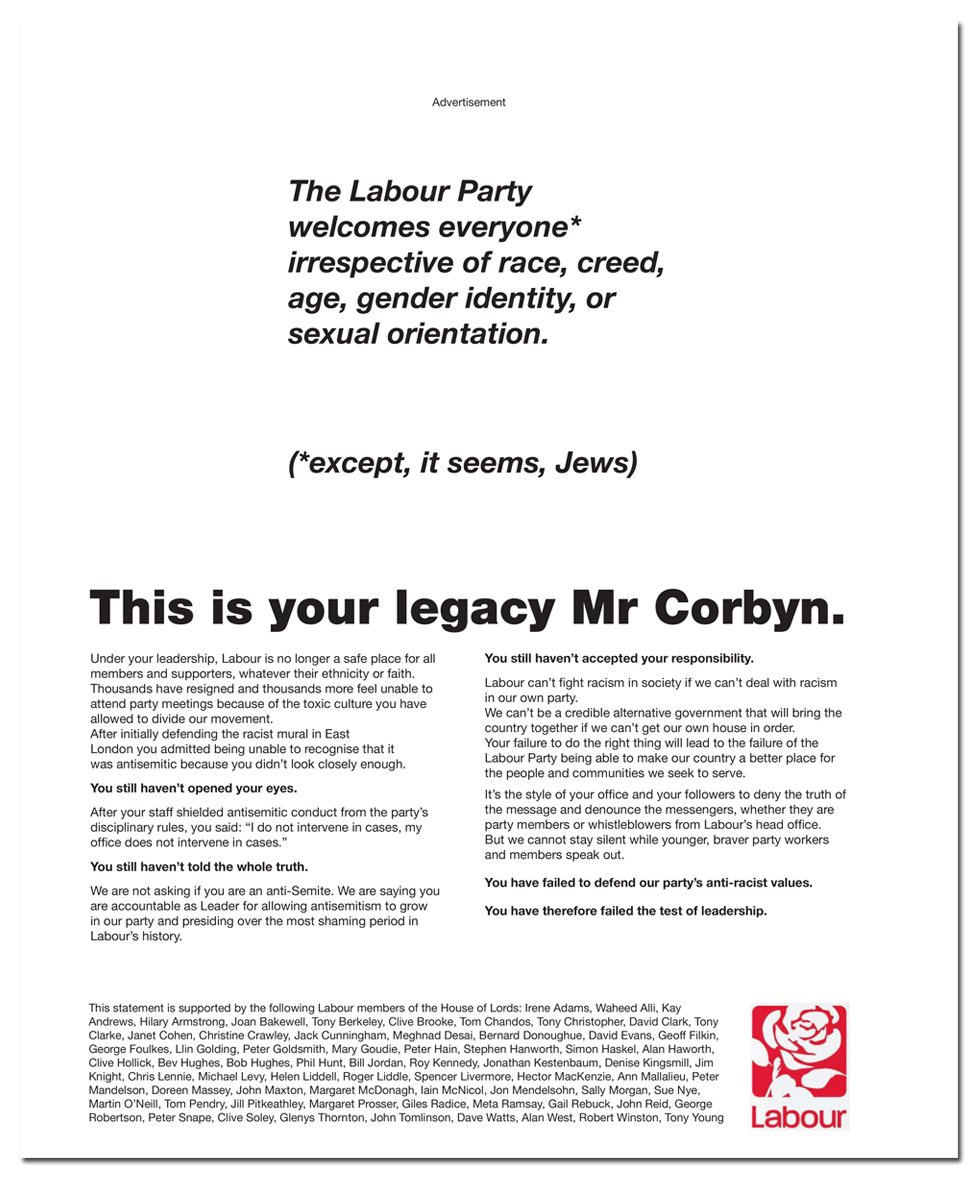
The advert signed by 60 Labour peers, that appeared in Wednesday's Guardian
Labour has been engulfed in a long-running dispute over anti-Semitism, which has seen nine MPs and three peers leave the party.
Last week, the BBC's Panorama revealed claims from a number of former party officials that some of Mr Corbyn's closest allies tried to interfere in disciplinary processes involving allegations of anti-Semitism.
As well as calls for an investigation into the claims made in the programme, the Labour leadership is also under pressure to adopt an independent complaints process.
In the Guardian on Wednesday, the peers said Mr Corbyn had failed to accept responsibility for "allowing anti-Semitism to grow in our party".
"The Labour Party welcomes everyone irrespective of race, creed, age, gender identity, or sexual orientation. Except, it seems, Jews," the advert said.
"This is your legacy Mr Corbyn," it added. "Labour is no longer a safe place for all members and supporters," it said.
'Misleading claims'
About a dozen of the signatories are former ministers who served in the last Labour government - including Peter Mandelson, Beverley Hughes and John Reid.
Those who signed make up about a third of the Labour members of the House of Lords.
Shadow Chancellor John McDonnell hit back, saying the letter was "completely inaccurate".
He said some people wanted to use the issue as a "political weapon" - but he was focussed on sorting the issue.
When the Panorama documentary aired, a Labour spokesman said the former employees who had talked to the BBC were "disaffected", and included some officials "who have always opposed Jeremy Corbyn's leadership".
But more than 200 current and former staff wrote to Mr Corbyn to say the party had treated whistleblowers in an "appalling and hypocritical" way, and that the "moral responsibility" for the anti-Semitism crisis lay with the party's leader.
In February Labour released figures showing that the party received 673 accusations of anti-Semitism by Labour members between April 2018 and January 2019. However the scale of the issue remains disputed.
Meanwhile, there have been calls for the Conservatives to commission an independent inquiry into claims of Islamophobia by its members.
Earlier in the leadership contest, Home Secretary Sajid Javid pressed his rivals to sign up for one during a head-to-head debate.
Tory chairman Brandon Lewis has also refused to say how many complaints the party has received about Islamophobia, but he has insisted the numbers were "very, very small".
Correction 23rd July 2019: An earlier version of this article inaccurately said that Labour has never confirmed the number of anti-Semitism cases it is investigating and this has been amended to confirm that the party did release figures for a 10 month period in 2018/19.
- Published18 November 2020
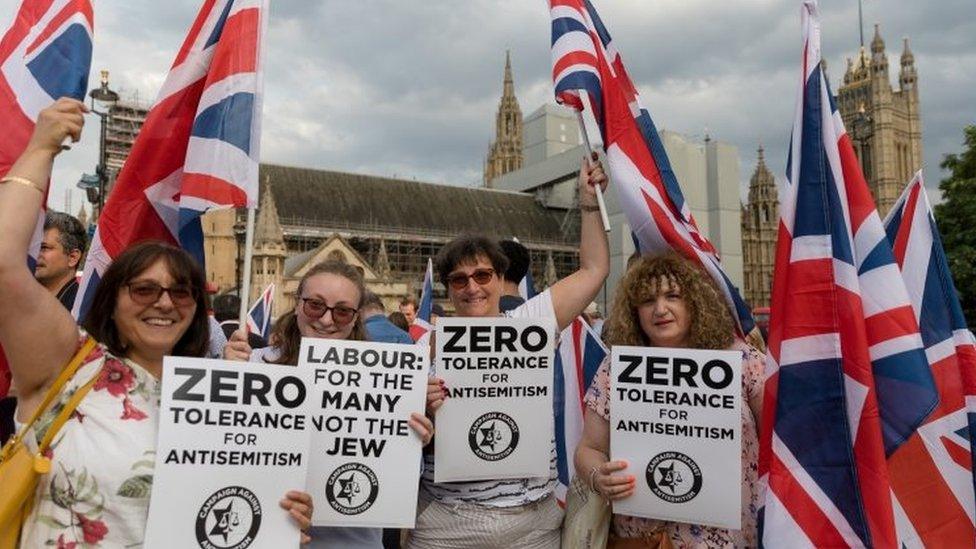
- Published15 July 2019
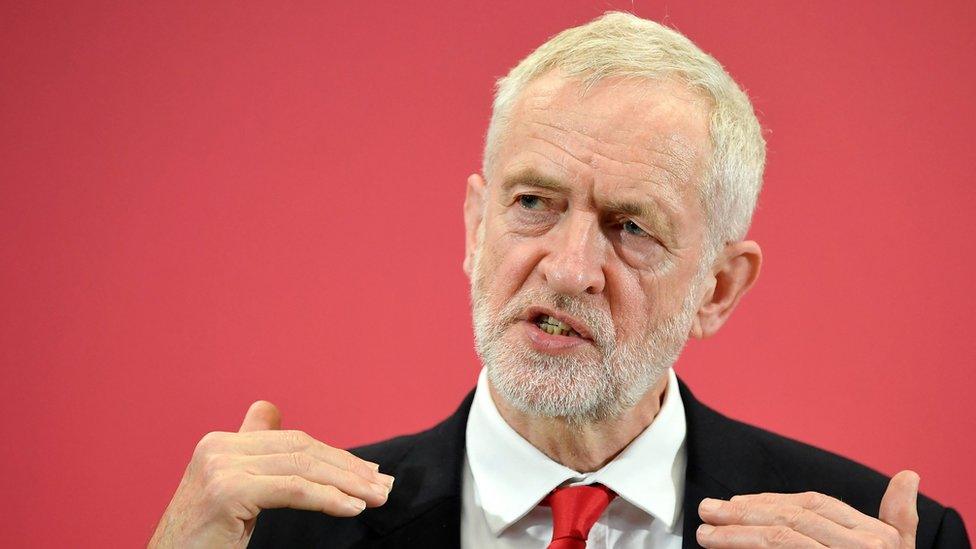
- Published14 July 2019
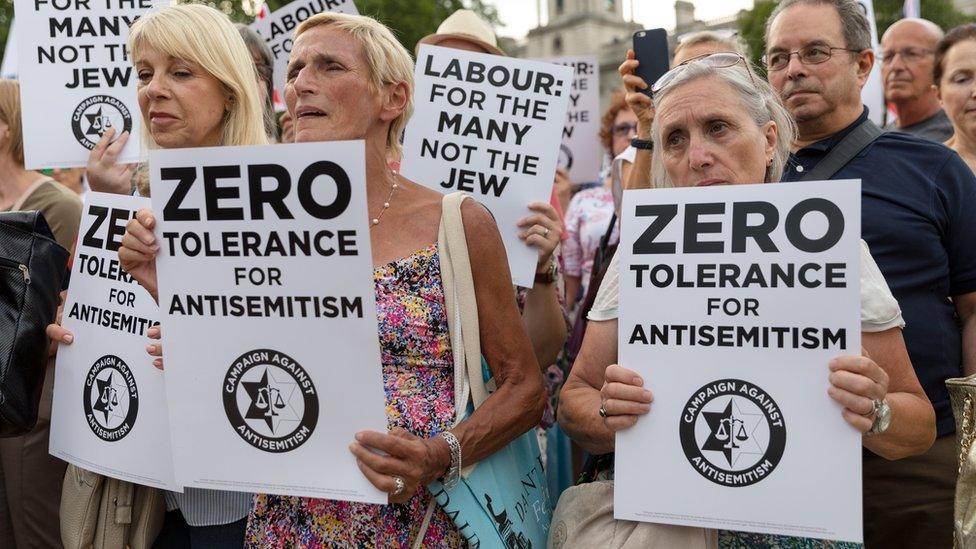
- Published10 July 2019
